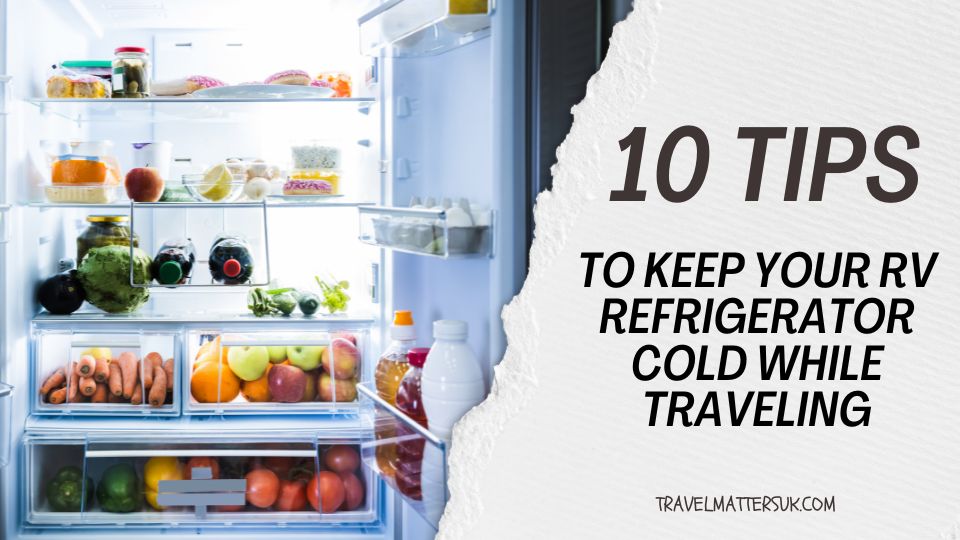The thrill of the open road, the freedom to explore new horizons, and the comfort of home on wheels – these are some of the many joys of embarking on an RV adventure. Yet, for those who have experienced the nomadic lifestyle that RVing offers, there’s one challenge that can’t be ignored: keeping the RV refrigerator cold while traveling.
Your RV refrigerator is the heartbeat of your mobile kitchen, responsible for preserving your food and beverages throughout your journey. Whether you’re cruising along scenic highways, camping in the wilderness, or simply parked at a picturesque spot, ensuring that your refrigerator maintains a chilly temperature is essential for both safety and convenience.

In this comprehensive guide, we’ll delve into the art and science of keeping your RV refrigerator cold while traveling. We’ll share invaluable tips, tricks, and expert insights that will empower you to conquer this challenge and embark on your RV adventures with confidence. So, before you hit the road, let’s dive into the secrets of maintaining a perfectly chilled RV fridge.
How to Keep Your RV Refrigerator Cold While Traveling
Are you planning an exciting RV adventure but worried about keeping your refrigerator cold during the journey? We’ve got you covered! In this guide, we’ll share practical tips and insights to help you maintain a chilled RV fridge throughout your trip.
Keeping Your Food Fresh on the Road
1. Precooling Your RV Fridge
Before hitting the road, make sure your refrigerator is properly cooled. Start by turning it on at least 24 hours in advance, setting it to the desired temperature. This ensures it’s ready to keep your food cold from the get-go.
2. Organize Your Items Strategically
Efficiently packing your refrigerator is crucial. Place perishable items like dairy and meats toward the back where it’s coldest, and keep frequently used items near the front to minimize cold air loss.
3. Use Refrigerator Fans
RV refrigerator fans circulate cold air more evenly, preventing hot spots. Consider investing in battery-operated fans designed for RV fridges for optimal cooling.
Insulation and Maintenance
4. Insulate Your RV Fridge
Adding extra insulation to your refrigerator can help maintain lower temperatures. You can use reflective insulation panels or fridge-specific thermal blankets for this purpose.
5. Check Door Seals
Regularly inspect the seals on your fridge doors for any wear or damage. Damaged seals can lead to temperature fluctuations. Replace them if necessary to keep the cold air in.
You may also like: WHY KEEP A BREAD CLIP IN YOUR WALLET WHEN TRAVELING?
Power Sources and Energy Efficiency
6. Opt for Propane While Driving
When on the road, running your RV fridge on propane is a smart choice. It ensures continuous cooling without relying on your vehicle’s battery or generator.
Using propane while driving is efficient but requires precautions. Regularly inspect your propane lines and tanks to prevent leaks, which can lead to fire hazards. Turn off the system if you detect a propane smell and address the issue promptly.
7. Use a Generator or Inverter
If you prefer electric power, invest in a generator or inverter to supply your RV fridge with the necessary energy. Ensure they are in good working order before your trip.
For environmentally-conscious travelers, portable solar panels are a “green” alternative, especially when your fridge runs on battery power. This method is eco-friendly and minimizes your environmental impact.
Additional Tips for a Chilled Journey
8. Park Strategically
When parking for an extended period, position your RV to minimize sun exposure on the refrigerator side. Shade can significantly help maintain lower temperatures.
9. Avoid Overloading
Don’t overload your RV fridge. Crowded refrigerators have poor airflow, leading to uneven cooling. This can also cause items to freeze or spoil.
10. Monitor Temperature
Invest in a refrigerator thermometer to keep a close eye on the temperature. This way, you can make timely adjustments as needed.
Understanding RV Fridge Power Sources
RV fridges can be powered through different sources:
- Electricity: Typically 120V power from shore power.
- Propane: Commonly used in “two-way” fridges, which also require a 12-volt battery for ignition.
- Battery: “Three-way” fridges run on battery power in addition to propane and electricity. They can operate off your RV’s house battery.
Frequently Asked Questions
Q1: Can I use my RV refrigerator while driving?
Yes, you can! RV refrigerators are designed to work while the vehicle is in motion. Simply ensure it’s well pre-cooled before hitting the road.
Q2: How can I make my RV fridge more energy-efficient?
To boost energy efficiency, maintain proper ventilation around the fridge, and consider installing additional insulation.
Q3: Can I run my RV fridge on solar power?
Yes, you can use solar panels to power your RV fridge. However, ensure you have the appropriate setup and battery capacity.
By following these tips, you’ll be well-prepared to keep your RV refrigerator cold while traveling, ensuring your food stays fresh, and your journey is worry-free. Hit the road with confidence and enjoy your RV adventure!
Remember, a well-maintained fridge is key to a successful trip. Safe travels!